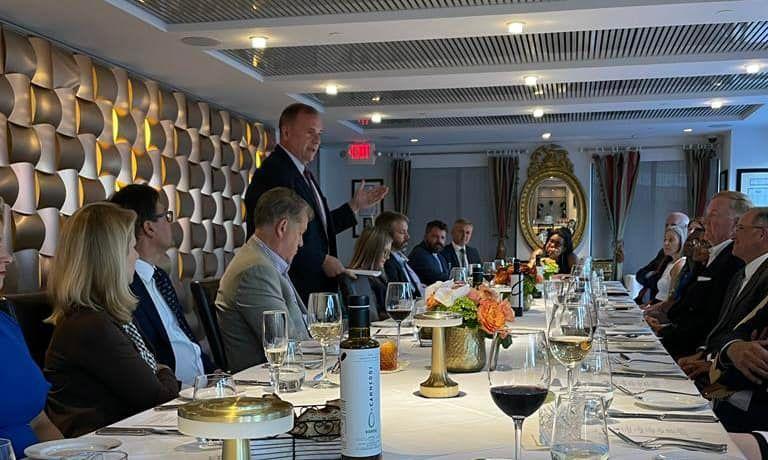Future Security & Defence Council: Dinner Briefing in Washington D.C.

As part of the Future Security & Defence Council (FSDC) project aiming to support NATO’s ongoing defence innovation work by portraying key elements of a future NATO Defence Innovation Ecosystem, GLOBSEC hosted a dinner briefing in Washington D.C., on Friday, August 12, 2022. The goal was to present the outcomes and recommendations of the project’s final report, “Adaptive Portfolio: Catalysing NATO’s Performance Through Innovation.”
The report focuses on three crucial issues – geoeconomics, innovation, and defence spending. It shines a light on the topics that should currently be at the centre of the Alliance’s attention and pushes NATO to test to failure. Simultaneously, the report’s findings and recommendations encourage stakeholders to do more, train more, and take a risk in innovation efforts.
The dinner briefing was attended by representatives of both state and private sectors, think-tank experts, and the media. Having such diversity around the table ensured various views and interesting insights were voiced and exchanged.
FDSC members, Generals Curtis M. Scaparrotti and Ben Hodges, started the discussion and provided an overview of the report’s key points and their take on the current security environment.
As revealed during the discussion, the final report’s message is highly relevant also to the war in Ukraine, which broke out several months after the beginning of the FSDC project in the fall of 2021. With the war, NATO has simultaneously found itself in front of a unique opportunity and a challenge. Nonetheless, there has not been a greater need for credible deterrence since the end of the Cold War than there is now.
With numerous weaponry donations to Ukraine and defence budgets ramping up, NATO members have an opportunity to not only modernise their militaries but also to craft a more comprehensive joint strategy, as well as improve procurement and interoperability to ensure their security.
In general, the discussion offered many interesting points and remarks that are summarised below:
- The war in Ukraine has shown that the country possesses a significant innovative potential which is likely due to its former position as the heart of Soviet industrialisation. In fact, numerous states within the Alliance, often smaller in size, have the innovative potential to produce niche technology or develop dual-use technologies. To meet the requirements and close capability gaps, innovation is inevitable.
- More strategic thinking is needed within the Alliance. The countries are not lone islands in the ocean but part of regions, which often influences their behaviour, threat perception, priorities, and security requirements. By understanding the environment, the Alliance can better prepare itself, better understand the developments, and react better.
- Defence and security need to be understood more comprehensively. It is a complex issue that includes not only conventional security but also food, energy, and cyber, to name a few. This must be coordinated at the NATO level to ensure that the least-prepared member state meets the preparedness of the best.
- NATO failed on both sides of the Atlantic when no one could imagine a hot war at the borders of the Alliance. Innovation cannot happen without big thoughts and expectations beyond everyday agenda. Now, NATO has an unprecedented opportunity for the modernisation of capabilities, mainly on the Eastern flank, as many of these countries have donated various equipment to Ukraine. The question is how to conceptualise it and what is the holistic plan to make militaries capable and interoperable.
- Capable Europe must stand on its own industrial base. To sustain the supplies of military production vis-à-vis the demand, the U.S. industry cannot supply the absolute majority. There is a need to balance the desire for U.S. sales and profitable European defence industries.
- Strategic clarity versus strategic ambiguity. Allies are better-informed and possess an intelligence advantage over Russia. To protect the information is not to make ambiguous threats. For deterrence to be credible, more clarity is needed with any adversaries to ensure they understand the red lines and how the Alliance will react if they are crossed.